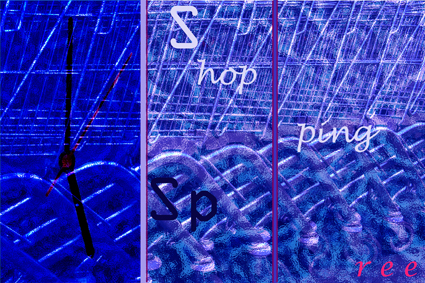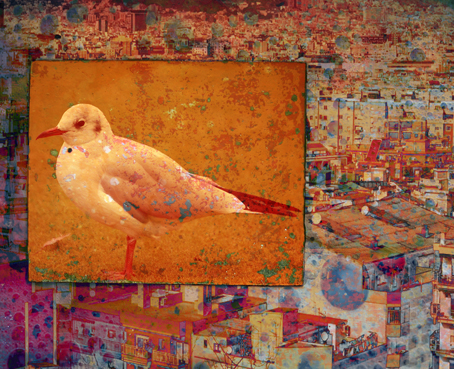28 February, 2007
Emotionally Lame
The three of us were stalwart lunchtime walking buddies (15-20 minutes/day) this last year. The university campus we work in borders wooded and farm land. There are some good walking paths weaving in and out of the surrounding area.
But, it was the jovial, interesting, interested conversation that made these outings such a treat. Three women (mid-twenty, mid-thirty, and almost fifty) sharing the ins-and-outs of their professional dreams, and the heart wrenching, still crazy, often amusing domestic disasters. It made for a wonderful mix.
I couldn’t even bring myself to express these sentiments to M. as she left this evening. I’ll probably not be able to express them to S. next week, when she leaves.
It’s really their fault; since I don’t have them around to keep my legs moving, I’ve become emotionally lame. Actually, the truth is I am just one of those shut-off-the-hose sort of persons when it come to farewells.
Those who know me well and long, have become accustomed to this personality deficit. They know that there is a fine line (approx. 3 minute time span) between the emotionally lame me giving a casual wave of the hand and a “See you later and off you go” farewell, and the teary mess of a me who goes into an Ugly Cry and starts hiccuping in very public places.
Neither of my walking buddies though has known me long enough to know this. Do you think I should tell them?
P.S. I asked another colleague today what the chances were that I could convince him to become my new walking buddy. His answer: 0%. Well, you got to like a straight answer, don’t you?
P.P.S. For those of you wondering, the 0% wasn’t personal; from his point of view, taking 15 minutes off from work to do something other than eat was a waste of time.
My Highlight In Berlin
26 February, 2007
Net Neutrality
This video is, I suppose, for younger users. Very much like the lightness or comic aspect, mixing with the serious explanations.
The basic argument of this video makes more sense to me, though I wish they had left out some of the more emotional reactions of Internet users in the clip.

Save the Internet | Rock the Vote
25 February, 2007
Graffiti Snippets

Two elderly women. Women of a certain age. Bejewelled. Bedazzled. Where is Fellini when you need him? Big-haired, caked makeup, crayoned on eyebrows, fat false eyelashes, puckered lips, grey pigment smokers’ skin.
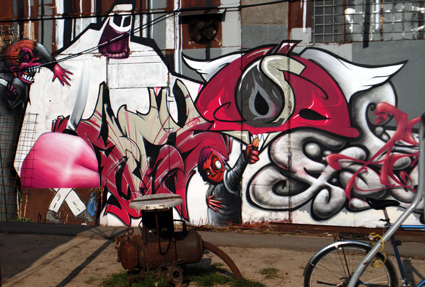
Everywhere you go, you hear different languages spoken. In one café, a united nations of customers. What a delight. It’s almost possible to believe that the café could be located anywhere in London, Paris, Milan, or in another European city.

I know a few people who live in Berlin. Most of them are single. One of my friends who is single, has an extended circle of family and friends. Some of the others apparently have… what?... actually, they only have their work. Literally only that. No one to meet for a drink, a stroll along the waterways. Not even someone to call and ask how he or she is doing. What an odd concept of existence they live.
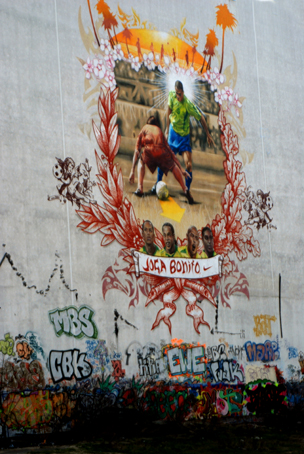
I’d love to come back here this summer with Nomad Son and Nature Girl. There is something very inviting about this city. It promises joyful and interesting encounters with various people and cultures.
23 February, 2007
The Right Mix

Maria and I managed to travel through this great metropolis straight as an arrow to our various destinations. Thank heaven, because it is cold, cold, cold, cold, in Berlin today. East Wind. Bitter deep-in-your-bones wind.

It obviously hasn’t been this cold since some of the trees have already blossomed. Unbelievable.

We browsed around a small marketplace in the park across from the Charlottenburg Castle. Only the hardy Korean (see collage), Lebanese (falafel stand), Italian (Italian specialties), and Polish (vegetables) sellers were out in the market selling their wares.

We visited the Berggruen Museum. Three floors filled with wonderful artwork from Matisse, Picasso, and Klee.
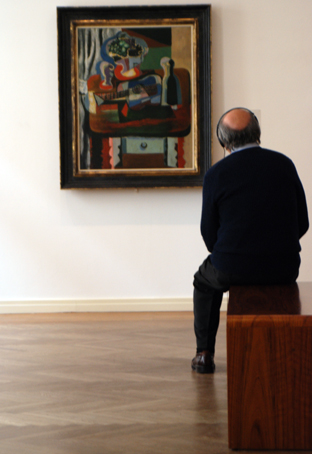
Each startlingly brilliant in their versatility. Each sharing enough similarities to lend a certain harmony to the exhibition as a whole. Each intrinsically different in temperament and Geist, thus making the visit very stimulating.
I was particularly struck by Picasso’s sculptures and Klee’s colours.
I left the exhibit wishing that Paul Klee was still alive and he could be a friend of mine.
Picasso, on the other hand, left me with the impression he was someone I would have avoided. Can you imagine being stranded on a lonely island with him? No matter how large the island was, it wouldn’t be large enough.
22 February, 2007
Strange Coincidence
Neukölln doesn’t have a good reputation, but my friend feels very much at home and the apartment block she lives in houses a diverse number of friendly families. And most importantly, there are a lot of children around. My friend used to live in east East Berlin and she said there are only elderly or childless people residing there now. The east school system was/is suffering greatly, and so anyone who could afford to move west did.
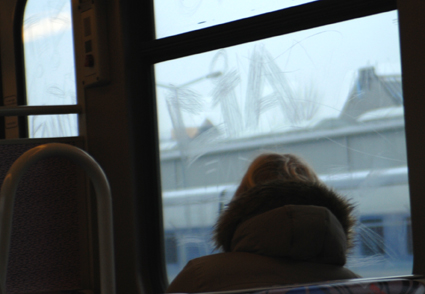
I took a streetcar into the center of the city this morning. The outsides of most of the subway and streetcars are covered with graffiti and the windows are also just an opaqued scratched meshes. You can imagine my surprise when I looked across from where I was sitting and saw my name scratched on the one windows. What a strange coincidence. A graffiti greeting from this astonishing cosmopolitan.
21 February, 2007
Celebrating
20 February, 2007
Gals Weekend Off
I bet there are a few of you, like my dear husband, who might be somewhat puzzled over my definition of “weekend”. Admittedly, “once work is over on Tuesday”, does not pop up in most people’s minds when you say, “I’m thinking of going off this weekend”. Some stickler’s might even say a weekend starts Saturday once the shops are closed and lasts until Sunday evening. The more generous minded, might even throw in Friday evening as of dinnertime.
It takes a mighty-minded (desperate) person to propose that “weekend” is a completely fluid term including any number of days as long as a Saturday or a Sunday, and preferably both are involved.
So, I’m off to Berlin tomorrow for the weekend with a few gals (there’s three of us). Ah, what could be more rejuvenating than weekend in the big city: museums, exhibitions, art galleries will be seen if one of us gals has her way, sight-seeing galore if the other gal has her way, café, café, café if this gal gets her way. Stay tuned…
19 February, 2007
Great Mystery
The author, Kim Stagliano (blog here), asks the very pertinent question of, “Why are so many more children autistic today in comparison to 20 or 30 years ago?” Apparently, way back then, only 1 child in 10,000 was diagnosed with autism. Now the figure is a staggering 1 in 120. Yes, you read that right.
It is beyond my comprehension to think of such an enormous increase in this disorder, disease (sorry, I don’t know what it is called). What has changed so fundamentally in the last two or three decades, which could induce, exasperate, trigger, and complicate… the occurrence and degree of autism?
Looking at another example, a cousin of mine has been a special needs teacher for nearly forty years. When she started working, there were only very few children in her classroom with allergies. In the last twenty-five years, she says an epidemic has arisen of seriously allergic children.
The rise in chronic illnesses such as allergies and asthma, or autism, can’t all just be genes or a natural predisposition. There must be something environmental, sociological, chemical, medical (think common and early use of antibiotics or diverse vaccinations) practices that are common practices today, which were not twenty years ago and which are affecting our young children’s health.
Ms. Stagliano has three children, all with varying degrees of autism. It is easy to understand why she might like to know the Why Is It So?
18 February, 2007
Walk Around The Block

Usually, on days like this, most of the people living in cities like Hamburg or Luebeck head out to the Baltic coast. The walkways along the beaches are choc-a-block, the coffee in the cafés are twice as expensive as in the cities, but oh how wonderful it is to see the sunshine reflecting off the sea like a million diamonds.

Yet, my walk around the neighbourhood was delightful. I saw still life of winter and springtime flowers, two elderly male friends deep in conversation as they walked along the canal, a Muslim couple walking arm-in-arm on the sidewalk ahead of me, and grandparents on an afternoon outing with their grandchildren.

I saw four front doors similar to each other, but each unique. These doors are from houses on Purgatory Lane, left of Hell Lane, and right before Paradise: a piece of grass at the front of the Luebecker cathedral.

Paradise of Luebecker Cathedral
History has it, that years and years ago, if someone committed a crime and somehow made it to Paradise at the end of Purgatory Lane, then the church gave you asylum from being tried by civil law. Instead, you were tried by the church’s laws. You had to be a bit careful about who caught you: if you were an adulterer then you stayed away from Paradise: if you embezzled some funds you just had to outrun the police and into the arms of the pastor for a more lenient sentence.
Climbing Precarious Heights
Now that my two children are older (12 and 16), I still don’t know whether Tammy and popular German saying is right. Is parenting harder now than it was ten or twelve years ago? Are the problems bigger?... (more)
16 February, 2007
First Generation
My parents, Canadian, had four children; none of who were born in Canada. My friend, Anna, and her sister, were born and raised in Canada, but lived in a Polish, Russian Canada that was nothing like any of the Canada that I got to know.

Anna’s parents were old when they immigrated to Canada: nearly the age of my grandparents really. They were Polish. They had come to Canada as refugees from a Russian labour camp. After the second World War.
A war my uncle served in and survived. My father was too young to serve. I never found out why Anna’s parents were in that labour camp. Just that they had survived, but not their two sons. Their two sons had died.
They came to Canada, without their sons, but eventually they had two daughters: Anna and her sister. Anna said her mother thought it was some sort of punishment from God, having daughters in Canada after leaving the sons behind in Russia.
Anna could never figure out why her mother thought this. It was some sort of family secret: the Polish-family-in-the-Russian-labour-camp secret. Not her family; the Canadian family living in a Polish, Russian neighbourhood. Whatever the reason, it made her mother infinitely sad. So, sad that Anna, with her Canadian cheerfulness, with her unencumbered lightness of being, could never compensate her mother for her loss. “Look at me mom, see how high I can jump” did not distract her mother from constantly looking inwards at past images of times long gone, in countries far away.
Anna and I met when we were adults. Canadian gals. She, who spent her whole life in Canada, could not shake off the weight of her parents’ past. I, who spent half of my life up to that point in time living in various countries, struggled with a need to be, feel, different than my other Canadian friends. Except that we both probably were normal, average types of Canadian gals. That is the way it was back then. I wonder whether it is the same now.
15 February, 2007
Wishful Thinking
Ode to Olive Oil

After these last weeks of story writing, think I am going to switch to making collages again. This one was inspired by a new brand of Italian olive oil we are using.
When I was young, I remember my mother using Crisco Oil. It was a “cooking” oil. Meaning we used it for everything. Years went by, and she eventually did buy some olive oil. I believe she used two or three tablespoons when making certain salads.
I moved out of our home early on and, I don’t quite remember when it was that I first started buying olive oil instead of Crisco oil, but twenty years or so ago it became the oil of my choice.
We might be able to go weeks without butter, but we can’t do without our lovely olive oil.
14 February, 2007
Valentine’s Day
My Stumble program hasn’t been bringing up films of love or romance, rather videos about smart people (here and here): people who live in their brains. Is the Stumble program tying to tell me something? Perhaps, to forget romance and get those grey cells moving.
P.S. Yeah! Nature Girl won!
13 February, 2007
Fascinating Sights
Years ago, I had the rare and fascinating experience of flying from
12 February, 2007
Meeting My In-laws

This is the last story of this series. I thought I would write one of my own embarrassing moments. There have been so many, how to choose? I decided to write about the first time I met my future in-laws.
My husband comes from a large Italian family. Nine kids in all. A tyrannical father: who long ago alienated himself from his children. A mother who bore and raised their nine children more or less on her own, while coping with her difficult and unemployable husband. She worked for more than 25 years on a production line: hard, precise work with various hard metals, which unfortunately, in time, ruined her use of her elbow, shoulder, and neck vertebrae. She is a woman who caries herself gracefully and possesses a grace of spirit as well.
I didn’t really know any of these facts when I met my husband. He is a gracious person, like his mom, but he is very reserved as well. Not what you’d typically imagine an Italian boy raised by six sisters would turn out to be like. I knew he had a slew of siblings, brother-in-laws and sister-in-laws, nephews and nieces. I hadn’t given his family much thought until he invited me to come and meet them all at his sister’s up-and-coming wedding in two weeks’ time.
So began an intense study period: siblings’ names, sequence or position of occurrence in the family line, spouses’ names, offspring names and ages, profession learnt, job situation (employed or unemployed), etc. The more I learnt, the more I felt inadequate to master the social situation of meeting them all.
What I didn’t realise, thankfully, was, the whole time my husband-to-be was prompting me about his family, his six very curious sisters were squeezing out every bit of information their brother knew about me. And what I didn’t realise, even more thankfully, was that the little bit they did learn did not paint me as a good prospect for their dear brother: an older woman (3 years), single mother (obviously not a virgin), foreigner (non-Italian, non-German; you’re right, coming from an Italian immigrant family, this does sound a bit bizarre), electrical engineer (a men’s profession, she must be butch), and living in Germany without family (aka black sheep). In their eyes, a future relationship between their brother and I, didn’t brew well.
Off we go to the wedding. I was so nervous that I cannot remember anything about the wedding ceremony, other than it went on for ever and ever. The reception was held a half hour’s drive away. We’d rented a car for the occasion and, as I am a nitwit when it comes to navigating, we were the last to arrive at the reception.
By this time we did arrive, everyone was seated and they had drunk their first (second and, in some cases, possibly third) glass of champagne. The only seats free for us were at the Reject Relative or Miserable Misfit table: next to aunt Glum, uncle Castrated, and the Nerdy nephew whose one passion in life was collecting old radio transformers from antique stereos. Then ensued a torturous hour of stuttering conversations (I’m sorry, there is only so much I know or want to know about radio transformers). I couldn’t even drink because I was the designated driver. During all the awkward silences I amused myself by listening to my stomach’s rumbling and mumblings. I was so hungry: I hadn’t eaten that day out of nervousness.
Note: boredom or tedium is the perfect cure for nervousness, but it is also a great perpetrator of hunger.
After what seems like hours later, we were finally able to go to the evening buffet. It was a huge u-shape affair with a wide selection of entrees, two soups, five main dishes, and baskets of homemade bread, platters of cold cuts, and bowls and bowls of salads. I thought that, if nothing else, at least I could feast until I pop.
Quietly, I made my way along the tables: soups—beef and something with pork feet floating in it, bread – sprinkled in bacon bits, main dishes – pork, beef, veal, meat pies, ham … I was half way down the table when I realised that every dish had meat in it. I hadn’t seen such a meaty meal since my days of living in southern Germany, where they don’t even mention the ham bits or bacon bits that accompany every dish on the menu, because they are there by default.
Back to the buffet table… Out of desperation I start removing the garnish from the cold cut platter and placing it on my empty plate. After a little while I have quite a nice selection of parsley stems, curly carrot shavings, clusters of grapes, and finely cut slices of red, yellow, and green peppers. I was so concentrated with my task, that I didn’t notice two of my future sister-in-laws standing just a short distances away. That is until one says loudly, “Oh my gawd, she’s a bloody vegetarian too boot!” I look up at her expression of aghast and down at my plate of veggie bits and break out into a blush of mortification.
11 February, 2007
being and becoming
 My good friend maureen in Grenada just wrote a lovely piece for the Red Tent Blog. Please take a look here.
My good friend maureen in Grenada just wrote a lovely piece for the Red Tent Blog. Please take a look here.
Country Bumpkin

Mary’s mom came to live in the Big City (Toronto) at the end of the 1950s. She came from her family’s farm in northern Ontario to attend secretarial college and then she landed a job at a large law firm when she finished.
Now, Mary’s mom had never been sick before coming to live in the city. Matter of a fact, she had never visited a doctor before. She was born at home with the help of a midwife. The cold, clear, clean northern air and home grown food helped her siblings and her grow into healthy and happy adults.
Much to her dismay, she came down with a very painful bladder infection during her secretarial studies. A friend gave her the name and address of a general practitioner not far from the college. So, Mary’s mom goes off early the next morning to see the doctor. The doctor examines her and says that she should come back again the next day with a urine sample. He explains to her that she is to use a sterilised jar to collect her urine.
The next day Mary’s mom arrives back at the doctor’s office with a large pickle jar containing all of the urine that she peed in the last 24 hours. A good two-litres worth.
10 February, 2007
Nurse In One Flew Over A Cuckoo’s Nest

Do you remember Nurse Ratched in the book, One Flew Over A Cuckoo’s Nest? My friend George had a run in with her a while ago.
George comes down with this pain in his lower abdomen. It’s Sunday morning, and he’s had the pain since Friday afternoon. It is just getting worse and worse. He’s worried that it could be his appendix, so off he goes down to the emergency room of his local small town hospital. Unfortunately, everyone else in the surrounding area and their relative are in the emergency ward as well.
The waiting room and the long corridor leading down to the administration desk are choc-a-bloc patients. At the head of all this misery sits Nurse Ratched on her throne, behind a sliding glass window, a typewriter, and a wide selection of hospital forms all to be filled out in triplicate.
As a new patient, George has to wait in a line up on the left side of the corridor to tell Nurse Ratched that he is ill. Then he has to wait in the line up on the right side of the corridor for his chance to fill out the hospital forms in triplicate with Nurse Ratched; who only uses one finger and one eye to type. The other eye is starting at George and making sure he doesn’t show any signs of impatience or pain. Because, if he does show any impatience or pain, and of course he does, she types slower and speaks meaner to him.
Then George sits in the no-mans land, otherwise known as the waiting room, until he knows his pain is his appendix and he feels just about capable of surgically removing the faulty organ himself with the aid of his nifty Swiss army knife.
Finally, at long last, Nurse Ratched instructs him to go into cubicle 3 and remove his clothes and get into the hospital gown lying on the examination table, the doctors will come soon to look at him. He waits in cubicle 3 so long; he’s worried that everyone else has left for the night. So, back he goes, shuffling along in paper slippers, clutching the back of his hospital gown for modesty sake, through the waiting room and along the corridor to Nurse Ratched to inquire whether or not he can expect to see a doctor any time this century.
Nurse Ratched stares at George with her one eye. She says he will see a doctor as soon as he brings her a urine sample: the container is in cubicle 3 on the shelf. George goes back to cubicle 3 and there, fair enough is a container. He proceeds to pee in the container, but instantly realises that he is in Big Trouble. He’s been sitting so long on various sides of the corridor or in the waiting room, that his bladder is full. There is no way that he can just pee a few drops and shut off the flow as it were. There is also no toilet or sink or any other possible vessel to take the overflow: nothing but the container in his hand that is getting fuller and fuller. Oh gawd it is so full that there is this dome of suspended liquid jiggling a millimetre over the top of the container.
Mortified. Humiliated. He makes his way slowly through the waiting room and down the long corridor. He’s holding the container with both hands, so as not to spill any liquid, backside exposed through the gapping hospital gown, and he is furiously thinking what he can say or do to Nurse Ratched when he finally arrives at her desk. There has to be something he can say that will sting. Something that will make her realise the error of her ways. But, as he approaches the sliding glass window, he knows there is nothing that will wipe the distain from her one eye. There is no soul inside of that eye. There is no blood flowing through the veins of Nurse Ratched.
He delicately places the container filled to the brim in the middle of the counter in front of the sliding window without spilling a drop. Then he looks over at Nurse Ratched and mouths the words, “You win”. With that, George goes back to cubicle 3, puts on his clothes, and walks out of the hospital.
He then calls me to pick him up and drive him to Toronto (two hour drive away), where he gets his appendix removed the instant he enters the emergency room of the university hospital.
09 February, 2007
Un-natural Habitat
A Pleasant Outing
All the birds are housed outdoors. That is, other than the tropical birds, who are housed in a “rainforest” atrium. The day is bitter cold. My friends are almost the only guests in the park and soon freezing their toes off. So they take refuge in the warm atrium.
The birds live in the trees and vines in this beautiful tropical landscape. There’re no bars or glass windows separating them from the guests. You just stroll down certain marked lanes winding in and around the trees, ponds, and floral arrangements.
My friend asks one of the female guides for permission for her and her son to use two of the chairs in the entrance area to eat their picnic lunch before heading home. The woman tells my friend the area isn’t heated and not very comfy, and then, before my friend can respond, off the guide goes into the entrance area and comes back with two chairs and places them near one of the ponds.
My friend and son have a delightful picnic in the rainforest. She told me that she felt like Alice in Wonderland.
The Mousetrap Of Cockiness

Jared just finished taking his final law exams. He and all the other hundreds, or is it thousands, of graduating law students are scrambling desperately to find jobs. Months go by after graduation, and no one seems to be getting any good job offers; only those with connections (i.e. daddy is a partner at a well-known practice) are working. Some of the brightest, cockiest, most ambitious graduates knuckled down under the pressures to pay off their school loans and took on boring government positions.
Jared gets an interview for a junior position at one of the most dynamic law practices in Toronto. The four young (mid-forties) partners are practicing criminal law and they’ve been fishing in one sensational case after the other. Not a week goes by, without one of their clients’ cases hitting front-page news. These guys are mavericks and the cases they get are as tricky to handle as drawing a straight line through an Esher drawing. And here, Jared lands an interview to work for them. He’s the envy of his graduating class.
And the interview goes like a dream. Intelligent questions, even more intelligent answers, wit, irony, quick repartee back and forth between the partner who is giving the interview and Jared. The job is in Jared’s back pocket. He’s already envisioning what type of car he’ll drive, what condominium he’ll buy, where he will spend his next vacation. Finally, the partner winds down the interview by asking Jared where he sees himself in twenty years time. Jared replies, “Opening a small shoelace factory on some South Sea island and watching the sun set every evening”. All the animation drains out of the interviewer’s face, with a cold stone expression, he replies, “Wouldn’t we all? Wouldn’t we f#*+59ing all.”
And with that, the interview is over. The job opportunity lost. What Jared forgot in his cockiness was that the person sitting across from him at the interview, the partner of the law firm he dreamed of working for, was himself (Jared) in twenty years time. Someone who works eighty-hour weeks, never goes on vacation, hustles like a shark to get the best cases, has already been divorced twice, is childless, and has more money than he knows what to do with, but no friends that he can trust implicitly.
08 February, 2007
Trying Unsuccessfully To Emanate Sophistication

Salina, nineteen years old, has an older colleague at work, who knows the roadies manager of one of Germany’s best know pop stars. It so happens that this famous pop star is touring Germany (it’s a question whether he does any else but tour Germany) and is giving a concert in a city not too far away from where Salina lives. Salina is invited by her colleague to come with her to meet The Gang.
Nervous, excited, a bit overwhelmed, Salina finds herself, the afternoon before the concert, sitting almost, practically nearly next to this pop star and all of the technicians, musicians, managers etc. in their hotel restaurant. The waitress comes over to ask what everyone wants to drink. She takes Salina’s order first. Wanting to appear cool, chic, and ever so worldly, Salina orders a martini. The waitress then proceeds to take the rest of the orders: coffee, coffee, a coke, coffee, lemonade, a coffee… You got it, no one orders alcohol; the band and roadies are just beginning their day’s work. There’s Salina, with her martini in hand, fwishing she could melt into the floor.
07 February, 2007
A Friend’s Mischievous Nature

My friend, Ikky Maas lives in London. He is a professional dancer. He is of Dutch Indonesian decent and a gentle and gorgeous person. He is also chronically unpunctual.
This story takes place in Heathrow Airport’s arrival area. He arrives late, as usual, to pick up a friend of his, who arrived a while ago from Cameron. He goes up to the arrival gate and is looking up at the screen of the flight arrivals, when over the intercom system a very loud and very succinct announcement is made, “Would Mickey Mouse please come to the information desk, your arrival from Cameron is waiting for you. This is an announcement for Mickey Mouse. Would you please come to the information desk.”
Everyone in the entire arrival lounge, Ikky included, bursts out laughing at the notion of Mickey Mouse walking around looking for his friend, who, Donald Duck? It takes Ikky a split second to realise that he, Ikky Maas, is intended the Mickey Mouse. He considers waiting a while before going to the desk, but he concludes that the airport employee will probably joyously repeat the announcement any moment now.
So, off he runs over to the information desk and sure enough, there is is friend standing there with a mischievous grin on his face. Instead of greeting his friend, he furiously accuses him of instigating the embarrassing prank. He friend innocently shrugs his shoulders and says it is not his fault if the woman at the desk did not understand what he said because of his accent.
06 February, 2007
Even A Nobody Can Be A Somebody
After consulting friends and reflection on my own, while on the way to work on the bus in the morning, I’ve come up with a speech. (Thanks to C. and C. for reading and giving your opinions of the speech.)
If any of you, who are reading this post and are already BlogHer members, like the speech and would like to vote for it (oh, please), you just have to go here and vote. Please note that you have to put in your vote/comment for my speech as a “reply” to my speech/comment and not just write a comment to the posting.
If any of you, who are reading this post and are not yet BlogHer members (male and female members allowed), yet would be willing to go to all the trouble and sign up as BlogHer members to vote/comment for my speech, go here and here.
Sooooo, at long last…
Title of the speech: Even A Nobody Can Be A Somebody
Jennifer Hudson’s acceptance speech for Best Supporting Actor in the film Dreamgirls…
Thank you. Thank you. I just can’t believe this! Over the last weeks, whenever someone asked me whether I thought I’d win this Oscar, I usually answered, “Just getting nominated is winning”. That is sooo not true. This (holding up the Oscar) is winning! It’s like being struck by golden lightening bolt of pure wonder!
As many of you in the audience know, being nominated is fantastic. A nomination means so many different things. It’s a nod of recognition for risks taken. It can also be a bow from the wise and experienced members of the Academy to the young, untried, but enthusiastic. The award is a way of telling an individual they did good work, but also a way of complimenting everyone who stood before and beside them the whole time. When I was nominated for Best Supporting Actor, I knew it was for all of these reasons, but mainly the later.
There is not one member of my family who shouldn’t be up here on the stage with me right now. There is not one person involved in creating Dreamgirls who isn’t on my people-to-thank list (takes out a long piece of paper). Don’t worry, I won’t be calling my family onstage or start reading out the list; I’ll be doing all my thanking eye-to-eye and heart-to-heart. (Conspiringly) Scared you didn’t I?
I’d like to take this opportunity to thank all of you sitting in the audience tonight and all of you who cast your vote year-to-year for the grandness and generosity of your spirit. The depth and breath of your work entertains and sustains people around the world. And, in the case of this (holding up Oscar), you have shown me, and many others tonight, that even a Nobody can be a Somebody. Thank you.
The Blond Beauty

Jake is in his senior year at high school and he has a tremendous crush on the school’s Golden Girl. According to Jake, she is beautiful, perky-natured, and ever so sexy in a girl-next-door sort of way. Everyone is in love with her: the boys as well as the girls. Jake’s problem is that Golden Girl is so popular she doesn’t know he exists.
So, you can imagine his bliss when Golden Girl agrees to dance with him late one evening during a high school dance. A slow dance as well. A slow dance allowing him to draw his dream girl close to his body. So close. So Slow. He can even bury his head into her long golden blond hair.
And then disaster strikes. A strand of her long hair gets caught in his chewing gum. Golden Girl moves her head just a fraction and out pops his chewing gum onto the back of her head. Suspended, stuck, a blob of shame hanging down in front of his face.
In a desperate attempt to stop the tides of disaster, Jake comes up with a plan. He sucks the chewing gum back into his mouth and begins to grind his teeth back and forth in a desperate attempt to cut away the hair attached to the wad of gum.
This is where the story ends. I can’t, for the life of me, remember whether or not he succeeds in overcoming his plight. It doesn’t really matter, does it? Everyone hearing the story stops following the storyline the moment he begins to grind his teeth back and forth; we are suspended in a time warp of mortification.
Résumé Of Three-Year’s Work
It is quite wonderful to relive the moments spent with teachers and grade school and high school students working on their multimedia projects.
It sure would be lovely if, by some miracle, one of our submitted follow-up projects did get funding.
The indexed blog posted a funny diagram about the desperate state of our current work philosophy or practice. The combination of this diagram and doing the translations of the school projects this morning, makes me realize how nice it is that, for the last three years, I’ve haven’t had to work full-time doing something of little importance of no future benefit. Even though, I will, in all likelihood, be out looking for a new job position or career direction at the end of this month, I know there are some children and adults (teachers) who will remember this great project for a long time to come.
05 February, 2007
Taking The Mickey
Absolutely Mortified

Years and years ago I used to collect “My Most Embarrassing Moment” stories from friends and family. Actually, it was sort of a litmus test for any new friendship. I figured if my recently acquired friend was willing to entrust to me the secret of the most embarrassing moment in their life, then our friendship had a future. (Granted, warped thinking.)
These stories were not I-slipped-on-a-banana-peel-in-front-of-my-in-laws type of stories. No they were situations, or moments of complete and utter mortification. You must have experienced such situations: when something you say or do puts you into a totally unexpected embarrassing or mortifying point-of-no-return.

Over a decade or two, I collected these pearls of narration. I thought I might write down some of these stories, names and places changed of course, and share them with you. Perhaps, in return, you might share your most embarrassing moment story with me.

Please, please, tell! Send your story, names and places changed, to me at virtualredtent(at)yahoo(com). I promise to be discrete and not print the story in my blog unless you give your expressed permission.
04 February, 2007
Family Quotes I & II

Me (to Nature Girl): What do you want to give your friend Pia for her birthday?
Nature Girl: A real gift. Not a gift certificate this time. We always give a gift certificate.
Note: Gift certificates were hastily written notes, promising a trip to the zoo or something else along this line. They were desperate attempts to cover up the fact we had, once again, forgotten to go shopping when the shops were open. Can you tell me why all children birthday parties are on Sundays, when all the shops are closed?
Nomad Son (to me): Can I have a house pet?
Me: Don’t you like the rubber snake I bought you during our trip at the Montreal Arboretum?
Nomad Son: No, I just want something alive. Anything; but it has to be alive.
Rabenmutter (Raven Mother)

I am posting this story for my friend, S. She loves the story because whenever she hears the expression Rabenmutter she remembers my story and starts laughing. The episode has un-demonised the threat of her being a Rabenmutter (raven mother): a horrible expression commonly used in Germany to take mothers down a notch or two. In the dictionary Rabenmutter means uncaring mother, but this is nothing other than the tip of the iceberg in its multiple implications. I discovered what Rabenmutter means a long ago when my son, Nomad Son, was about two years old.
He and I were travelling together to visit my parents in Grenada over Christmas. For any of you living in Europe, you know how stressful it can be for anyone trying to fly somewhere warm at this time of year. The experience is a perpetual massive crush of people, tempers, and mishaps. The line-ups are long, the safety procedures, ubiquitous, the airline personnel are at their wits end.
Nomad Son and I were experienced travellers, even though he was only two years old; he had been flying regularly since he was six weeks old.
For this trip, I bought him a new backpack for all of his toys, change of clothes, and extra juice and baby food. When I bought the backpack at the shop, it looked quite small. At home, placed against his delicate two-year-old frame, the backpack extended over the length of his back and hung partway down his po. Once the backpack was filled with all of his paraphernalia, it didn’t hang so low, but stuck out horizontally like a fat beetle’s body.
Back at Hamburg airport…
After standing for over an hour in the line-up, we finally reach the check-in desk and I rush up and started taking out our tickets, reservation information, and passports. The impatient Lufthansa employee looks at me with this expression, which says: this is not going quick enough, I hate you, well maybe not you specifically, but anyone who is travelling with a child, ordering special seating, vegetarian meals, and baby meals, oh, please god-get-me-out-of-here, I can’t stand one more minute of this. And while she is silently communicating her misery to me through the expression in her eyes and her embittered cramped facial gestures, I hear Nomad Son yell out an “Umph!” behind me.
I turn around and there he is, like a beetle flipped over on his back, arms and legs flailing around. I encouragingly, brilliantly instruct him, “Turn over, sweetie. Turn over on your side!” And he does. He manages to swing over onto his side, then gets into a crawl position, and hoists the weighty backpack up like a true-blue bench presser. No mean feat let me tell you! I praise him for managing to get back up off the floor, and then look up proudly at the crowd standing behind him. Instead of the expected admiring faces, or isn’t-he-cute expressions, the adults are universally stone-faced. And, on each and every one of their foreheads, there sits blinking neon-signs with “ Rabenmutter” written all over them.
03 February, 2007
First Day at School

Germans tend to make a huge production out of children first day at grade school. The whole transition from kindergarten to grade school is a lengthy, expensive, and dramatic process.
It begins weeks before school is set to start, with saying goodbye to the kindergarten children and teachers: special sleepovers, farewell parties, present getting (to the children) and present giving (to the teachers and staff), etc. Then there is all the shopping you have to do.
The proper clothes must be found for the first day school celebrations: the various school supplies – easy as pie: the perfect school bag from a large selection of models from the traditional leather to the glitzy plastic with popular television characters printed on them: but, most importantly, you have to buy the reverted school cone. This cone, which is often almost as tall as the first grade pupils themselves, is to be filled with candies, gifts, and other marvellous things on the first day of school. Imagine a piñata in the form of a huge upside-down dunce cap. Many children buy their school cones months beforehand and then hang the empty cone up in their rooms, waiting for the Big Day.
They take their cones with them for the school celebrations, but, because the cone is covered, they have to wait until all the opening day celebrations are over and they are back at home before they can see what is inside.
The Big Day consists of an elaborate First Day School ceremony: including performances from the older grade school classes for the new grade one pupils, and speeches from the principal and other noteworthy individuals. They all welcome the children into the school in much the same way that the giant Mickey Mouse figures welcome the public to Disney World; with smiles and promises of all the wonderful things to come.
The children’s homeroom teachers then call off their class list with the names of their children and they all march around the auditorium, which is packed with parents, siblings, grandparents, godmothers and godfathers, ersatz aunts and uncles (the list is long). The children try to hold their heads up high and not drop their heavy school cones.
I am sure you are all waiting for the punch line of this story. Or perhaps, those parents of five or six year olds already have a suspicion of what is come… all this build-up, masses of expectations on the part of these children… Major Disappointment. I stood in the auditorium, with tears running down my face, at both my children’s first day celebrations, marvelling at the children’s innocence and dignity, and I wondered if all the theatrics weren’t just some cruel joke we were playing on the wee ones.
Yet, I put this thought away, as I made our way home with the new first grader and all the relatives and friends who were coming over for coffee and cake (yes, that too!) and to watch the child open up the school cone and all the other presents they received. How could the reality of going to school possibly live up to all of this?
02 February, 2007
To Be Or Not To Be II
This morning while riding on the bus, I tried to come up with more good examples of acceptance speeches other than that given by Emma Thompson at the Golden Globe Awards. Oddly, I could only remember speeches protagonists delivered in movies, and not actors when accepting awards. Is this due to the fact that many actors can act, but they can’t write? Do actors actually write their own speeches?
The only example of good writing I remembered this morning wasn’t even an acceptance speech, but a book dedication. For the life of me, I can’t remember who wrote it, other than he was British. I am paraphrasing here, but it went something like this:
“This book is dedicated to my loving and long-suffering wife. I wish to express my deepest gratitude to her for her constant and unfailing criticism and her complete lack of encouragement or support in my pursuit of a writing career. Without her, I would never have developed the resolve and tenacity to follow my inner calling.”
Perhaps, many people reading this dedication might initially think it rather harsh. Yet, the author wrote the dedication in such a way, which I haven’t been able to duplicate, that made it very clear that there was no one else on this planet whose opinion he greater respected, no person whose criticism was more valuable, and not one who could judge his work better than his wife. The ingenuity of the dedication was in its formulation.
There’s a Hole in my Mitten

My mother’s mother started knitting mittens for the Christmas church bazaars in the summertime. We’d see her constantly with her four knitting needles and a variety of different colours of wool in her hands.
She knitted endless pairs of mittens for the church community, as well as a pair for each of her grandchildren. The mittens were truly beautiful, as only things can be made with skill, love, and endless patience.
It was possible to identify the mittens my grandmother knitted among everyone else’s, because of the fine stitching and a small hole she made at the base of the thumb. Another girl at school wore a pair of her mittens; even though grandma’s church was three towns away.
I told her my grandmother made them and her face lit up. She said that her mother went every year to buy grandma’s mittens for her and her siblings. Her mother had to get to the church early because my grandma’s mittens sold out the quickest.
01 February, 2007
To Be Or Not To Be
My instant reaction was, “Yeah! I’ll give it a try!” The problem is that I was bedazzled by the contest prizes: FREE pass to either BlogHer Business '07 in New York or BlogHer '07 in Chicago (not that I could afford travelling or hotel expenses, but this is besides the point, I’d love to attend either conference). And, as all straight-A students, bridegrooms, retiring boss, mourning best friends know, bedazzlement doth not necessarily make a good speechwriter.
Right, it’s important not to focus on the win. But, how do you write a good speech?
Now, I learnt how to write a good thank-you letter when I was a child (here).
I even learnt how to express criticism:
E.g. Scenario: Your date arrives two hours late, and the wonderful meal you prepared is completely ruined. You’ve spent the last two hours going through so much “internal” dialogue that it makes that joke about the guy who wants to borrow a hammer from his neighbour (punch line: the guy storms over to his neighbour’s, bangs on the door, and screams at him “You can keep your %&##m* hammer!” to the clueless fellow) makes complete sense. So, in walks your date, do you say…
Choice A: You lousy so-and-so. You are always late. You are never ever on time. You are such a worthless swine.
Or,
Choice B: I am so mad, disappointed, and angry with you. When you show up late, it makes me feel totally useless. It is as if, your lateness is saying, “I don’t appreciate you”.
So, which one do you say. Choice B, naturally, or is that theoretically (never managed to get that straightened out), because with Choice B there is a slight chance for discussion. Whereas, with Choice A, the door to opportunity closes shut, as in airtight shut. The theory is that no one will react to Choice A by saying, “You are completely right! Do you have any suggestions about how I can change this: particularly in your present excited, aggravated frame of mind?”
And, somewhere along the line I learnt how to make a suggestion, proposal, or request:
- No long convoluted build-up or preamble; this makes people suspicious, bored, or impatient
- State clearly what you want person A to do for you.
- Explain briefly why you want A to do B.
- Explain the consequences if A does not do B.
- If applicable, present a reasonable alternative solution or tactic, but only if it still ends up with you getting B.
The trick is to do the above gracefully, politely, and with honest intent.
Back to speechwriting… How does it work? Like baking a tasty homemade cake, I know there are common ingredients, but I just do not know what order to apply them or what quantities to use.
Germans love to make speeches: especially in forms of rhyming poems. (Germans also loving making homemade cakes.) You can’t imagine how many wedding receptions, silver wedding anniversaries, 60th birthday celebrations are accompanied with poems written by someone at the party. I was even at a gathering once, an asparagus festival (to be mentioned at a later post), where each table had to come up with a poem about asparagus before they would be served.
I do remember one marvellous acceptance speech that Emma Thompson gave. It might have been for the BAFTAs (sort of the British Oscars) for Sense & Sensibility.* Her acceptance speech, for Best Director, was written by Jane Austin; that is, as if Emma Thompson was accepting the award on Jane Austin’s part. It was brilliant. It showed so succinctly the following points:
- Ms. Thompson knew her audience; speaking up rather than speaking down to their intelligence
- She was able to say a few provocative things without giving offence
- She gracefully expressed gratitude to numerous people without droning on and on
- She shown golden by shinning the light on others
The think is, Emma Thompson is a brilliant screenwriter, director, actor, and possibly possesses every other talent a speechwriter could ever require. I might admire her, but I could not emulate her.
Dear readers of this blog, can you write me the proper ingredients, the order of application, and dosage for writing a good speech? I’d be ever so thankful. Otherwise I don’t have a chance in hell of ever winning the prize of the BlogHer contest. Alternatively, could you send me links to other acceptance speeches you’ve enjoyed in the past…
P.S. Turns out it was the Golden Globe Awards and I saw the speech on the Extra Features of the DVD.
Uncle Harald

Uncle Harald reminded me of Frankenstein: tall, big-boned, large hands and feet. He used to smoke a pipe and had bad breath and big livery lips. He always wanted us children to kiss him on his mouth. This was gross. He was, I believe, an engraver by profession. He engraved jewellery and sport trophies. I thought he engraved tombstones.



